This article was co-authored by Siddharth Tambar, MD. Dr. Siddharth Tambar, MD is a board certified rheumatologist at Chicago Arthritis and Regenerative Medicine in Chicago, Illinois. With over 19 years of experience, Dr. Tambar specializes in Regenerative Medicine and Rheumatology, with a focus on platelet rich plasma and bone marrow derived stem cell treatments for arthritis, tendinitis, injuries, and back pain. Dr. Tambar holds a BA in Economics from State University of New York at Buffalo. He earned his MD from State University of New York at Syracuse. He completed his Internship, Residency in Internal Medicine, and his Rheumatology Fellowship at Northwestern Memorial Hospital. Dr Tambar is board certified in both rheumatology and internal medicine. He also holds Musculoskeletal Ultrasound Diagnostic and Interventional certifications from the American College of Rheumatology and the American Institute of Ultrasound in Medicine.
There are 11 references cited in this article, which can be found at the bottom of the page.
wikiHow marks an article as reader-approved once it receives enough positive feedback. In this case, 100% of readers who voted found the article helpful, earning it our reader-approved status.
This article has been viewed 266,481 times.
If you’ve ever had gout, then you know that it’s no joke. The pain, swelling, and tenderness in your joints and feet can almost feel unbearable sometimes. Gout is a complex form of arthritis that’s caused by having too much uric acid in your body, which is a substance that builds up as your body breaks chemicals called purines. Purines are naturally found in your body as well as in the foods that you eat. The good news is there are things you can do to help lower your uric acid levels. With a few healthy changes, you can help minimize your risk of gout and prevent future flare-ups.
Steps
Diet
-
1Eat lots of fruits, veggies, and whole grains for healthy nutrition. Load up your plate with lots of healthy fruit and veggies, which provide complex carbohydrates to fuel your body without increasing your risk of getting gout.[1] Stick with whole grains like whole-wheat bread and brown rice instead of refined carbs like white bread and white rice.[2]
- Reach for a piece of fruit whenever you want a snack. Some studies suggest that eating cherries may actually help lower your risk of getting gout.
- Look out for snack foods with lots of refined carbs as well.
-
2Focus on low-purine sources of protein such as lean meat and lentils. Eat lean cuts of meat and poultry, low-fat dairy, and lentils for rich and healthy sources of protein that have a lower amount of purines that can cause gout. Try to avoid fried or fatty meats and high-fat dairy products, which can raise uric acid levels.[3]
- Chicken breast, beans, peas, lentils, and tofu are all great sources of lean protein.
- Greek yogurt and eggs are also great sources of protein.
Advertisement -
3Limit yourself to 4-6 oz (115-170 g) of meat 2-3 times a week. Meats such as beef, duck, and pork are moderate-purine foods, meaning they can raise your uric acid levels if you have too much of them.[4] Try to cut back your consumption to a small portion a few times a week to reduce your risk of gout.[5]
- You can still enjoy these foods, but it’s important that you eat them in moderation.
-
4Avoid eating organ meats, game meats, and certain seafood. Organ meats like liver and wild game meats are high in purines, which your body breaks down into uric acid, so cut them out of your diet to minimize your risk of gout.[6] Additionally, some seafood, such as anchovies, sardines, herring, mussels, codfish, scallops, trout, and haddock are also high in purines, so try to avoid them as well.[7]
- Not all seafood is bad for gout. You can enjoy crab, lobster, oysters, and shrimp in moderation without increasing your risk.
-
5Stay away from sugary drinks and foods with added sugars. Fruit juice and soft drinks containing fructose can raise uric acid and increase your risk of gout, so try to cut them out of your diet.[8] Additionally, fructose and other refined sugars can be added to foods, so keep an eye out for them and try to avoid eating them.[9]
-
6Stay hydrated to help your body remove excess uric acid. Drink plenty of water to help avoid increasing your uric acid levels, especially after you exercise or sweat a lot. Studies suggest that drinking an adequate amount of water can help reduce or prevent gout attacks.[10]
- For most adults, an adequate amount of water is about 15.5 cups (3.7 liters) for men and about 11.5 cups (2.7 liters) of fluids a day for women.[11]
- If you take diuretics for a medical condition, talk to your doctor about how much water you need to drink each day.
-
7Take 500 mg of vitamin C a day to lower your uric levels. Studies suggest that taking vitamin C supplements can potentially lower your uric acid levels and reduce your risk of gout. Take a daily vitamin C supplement as a preventative measure.[12]
- Look for vitamin C supplements at your local vitamin store, pharmacy, or department store. You can also order them online.
- Talk to your doctor before you take vitamin C supplements, which can interfere with certain medications.[13]
-
8Drink alcohol in moderation to avoid gout attacks. Avoid excessive amounts of drinking, which has been linked to increasing uric acid levels and causing gout.[14] If you do drink, try not to have more than 2-3 in a 24-hour period.
- Drinking excessive amounts of alcohol can also cause you to gain weight, which can lead to gout.
Lifestyle Changes
-
1Get at least 30 minutes of exercise a day. Experts recommend that exercising for 30 minutes a day can reduce the symptoms of gout and help prevent future attacks. Try some moderate, low impact activities like walking, swimming, or biking to get your blood pumping and your body moving.[15]
- Try out a group fitness class to work out with other people.
- Exercise can also release endorphins that can boost your mood, so it’s not just for your physical health!
-
2Lose weight if you’re overweight to help prevent gout. If you’re overweight or obese, try losing some weight to lower your levels of uric acid as well as ease the pressure on your joints, which can help prevent gout. Eat a well-balanced diet and follow a regular exercise program to lose weight healthily and sustainably.[16]
- Try using a food tracker app to monitor what you’re eating and help you lose weight.
- Talk to your doctor before you make sudden dietary changes to make sure they’re safe for you.
-
3Join a self-management education class to learn to deal with gout. Look online for a self-management education class near you and sign up for it. Go to the class to get a better understanding of how gout can affect your life and what you can do to control your symptoms and live well.[17]
- Your doctor may be able to recommend a self-management class for you.
- It can also be helpful and comforting to meet other folks who have gout.
-
4Stop smoking to reduce your gout symptoms. If you’re a smoker, try quitting as soon as you can. You’ll improve your health overall and help prevent gout.[18]
- Quitting smoking can be tough, but there are a bunch of different things you can try to help make it easier such as nicotine gum, nicotine patches, or even acupuncture.
Medications
-
1Follow your treatment plan for any medical conditions you have. Some medical conditions, such as heart problems, diabetes, hypertension, or poor kidney function can cause gout.[19] If you have any of these conditions, it’s super important that you stick to your treatment plan to help reduce your risk.
- If you don’t have a treatment plan, work with your doctor to come up with one that works for you.
-
2Take NSAIDs to manage the pain of a gout flare-up. If you’re suffering from an attack of gout, try some OTC pain medications. Take nonsteroidal anti-inflammatory drugs (NSAIDs) such as ibuprofen, acetaminophen, or naproxen to help reduce the pain of a gout flare-up so you can get through it.[20]
- Your doctor may be able to prescribe steroids to help manage your pain during a flare-up as well.
- Ask your doctor about taking an anti-inflammatory drug called colchicine to treat your gout pain.
-
3Talk to your doctor before you take diuretics. Diuretics, also called water pills, are medications that make you urinate more and they can be prescribed for medical conditions like hypertension, also known as high blood pressure. They can also cause gout, so talk to your doctor about it before you take them to make sure they’re the best option for you.[21]
- Your doctor may decide to treat you with something else that doesn’t increase your risk of gout.
-
4Ask your doctor about taking uric-acid lowering drugs. If you’re having severe or frequent attacks of gout, talk to your doctor about taking medication to treat it. Ask about uric-acid lowering drugs that you can take to reduce your symptoms and help prevent future attacks.[22]
- If your gout is too severe, you may need to take daily medication to treat it.
Expert Q&A
-
QuestionHow can I prevent gout naturally?
 Siddharth Tambar, MDDr. Siddharth Tambar, MD is a board certified rheumatologist at Chicago Arthritis and Regenerative Medicine in Chicago, Illinois. With over 19 years of experience, Dr. Tambar specializes in Regenerative Medicine and Rheumatology, with a focus on platelet rich plasma and bone marrow derived stem cell treatments for arthritis, tendinitis, injuries, and back pain. Dr. Tambar holds a BA in Economics from State University of New York at Buffalo. He earned his MD from State University of New York at Syracuse. He completed his Internship, Residency in Internal Medicine, and his Rheumatology Fellowship at Northwestern Memorial Hospital. Dr Tambar is board certified in both rheumatology and internal medicine. He also holds Musculoskeletal Ultrasound Diagnostic and Interventional certifications from the American College of Rheumatology and the American Institute of Ultrasound in Medicine.
Siddharth Tambar, MDDr. Siddharth Tambar, MD is a board certified rheumatologist at Chicago Arthritis and Regenerative Medicine in Chicago, Illinois. With over 19 years of experience, Dr. Tambar specializes in Regenerative Medicine and Rheumatology, with a focus on platelet rich plasma and bone marrow derived stem cell treatments for arthritis, tendinitis, injuries, and back pain. Dr. Tambar holds a BA in Economics from State University of New York at Buffalo. He earned his MD from State University of New York at Syracuse. He completed his Internship, Residency in Internal Medicine, and his Rheumatology Fellowship at Northwestern Memorial Hospital. Dr Tambar is board certified in both rheumatology and internal medicine. He also holds Musculoskeletal Ultrasound Diagnostic and Interventional certifications from the American College of Rheumatology and the American Institute of Ultrasound in Medicine.
Board Certified Rheumatologist Lowering your consumption of red meat, shellfish, and alcohol will greatly reduce your chance of developing gout. Drinking cherry juice is also known to help prevent gout.
Lowering your consumption of red meat, shellfish, and alcohol will greatly reduce your chance of developing gout. Drinking cherry juice is also known to help prevent gout.
Warnings
- Talk to your doctor before you make any sudden dietary or lifestyle changes, especially if you have any underlying medical conditions such as diabetes or heart disease.⧼thumbs_response⧽
- Don’t take any medications or supplements to treat your gout without checking with your doctor to make sure it’s safe for you.⧼thumbs_response⧽
References
- ↑ https://www.health.harvard.edu/pain/how-to-prevent-gout-attacks
- ↑ https://www.mayoclinic.org/healthy-lifestyle/nutrition-and-healthy-eating/in-depth/gout-diet/art-20048524
- ↑ https://www.mayoclinic.org/healthy-lifestyle/nutrition-and-healthy-eating/in-depth/gout-diet/art-20048524
- ↑ https://www.arthritis.org/health-wellness/healthy-living/nutrition/healthy-eating/which-foods-are-safe-for-gout
- ↑ https://www.jstage.jst.go.jp/article/bpb/37/5/37_b13-00967/_pdf
- ↑ https://arthritisaustralia.com.au/managing-arthritis/living-with-arthritis/healthy-eating/gout-and-diet/
- ↑ https://www.arthritis.org/health-wellness/healthy-living/nutrition/healthy-eating/which-foods-are-safe-for-gout
- ↑ https://www.ncbi.nlm.nih.gov/pmc/articles/PMC6125106/
- ↑ https://www.mayoclinic.org/healthy-lifestyle/nutrition-and-healthy-eating/in-depth/gout-diet/art-20048524
- ↑ https://www.ncbi.nlm.nih.gov/pmc/articles/PMC6125106/
- ↑ https://www.mayoclinic.org/healthy-lifestyle/nutrition-and-healthy-eating/in-depth/water/art-20044256
- ↑ https://www.ncbi.nlm.nih.gov/pmc/articles/PMC6125106/
- ↑ https://www.stlukes-stl.com/health-content/medicine/33/000994.htm
- ↑ https://www.health.harvard.edu/pain/how-to-prevent-gout-attacks
- ↑ https://www.practicalpainmanagement.com/patient/conditions/gout/5-lifestyle-tips-gout
- ↑ https://www.cdc.gov/arthritis/basics/gout.html
- ↑ https://www.cdc.gov/arthritis/basics/gout.html
- ↑ https://www.health.harvard.edu/pain/how-to-prevent-gout-attacks
- ↑ https://www.cdc.gov/arthritis/basics/gout.html
- ↑ https://www.cdc.gov/arthritis/basics/gout.html
- ↑ https://health.usnews.com/health-care/for-better/articles/2017-06-09/gout-is-out-of-control-but-it-doesnt-need-to-be
- ↑ https://www.health.harvard.edu/pain/how-to-prevent-gout-attacks
About This Article
To prevent gout, drink at least 8 cups of water every day, which helps flush uric acid out of your body so it doesn't build up and cause gout. Also, try to eat potassium-rich foods, like lima beans and cooked spinach, since they can also help pass uric acid through your system. You can also prevent gout by avoiding sugary and fatty foods, as well as excessive amounts of meat and fish. If you drink alcohol, try drinking wine instead of beer since beer is more likely to worsen gout. To learn how to prevent gout by reaching a healthy weight, scroll down!

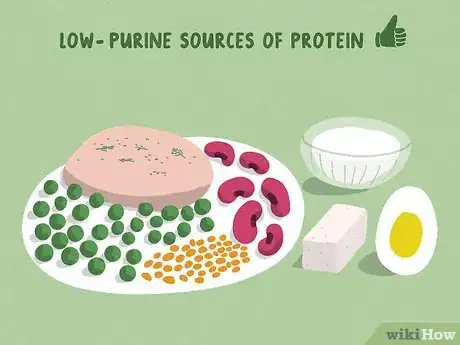

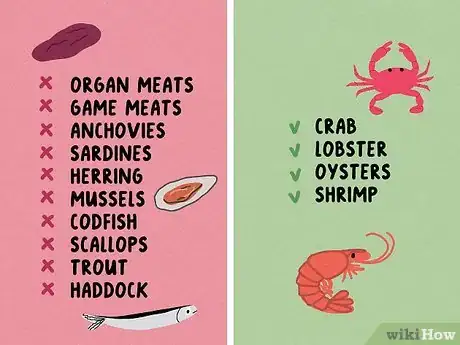


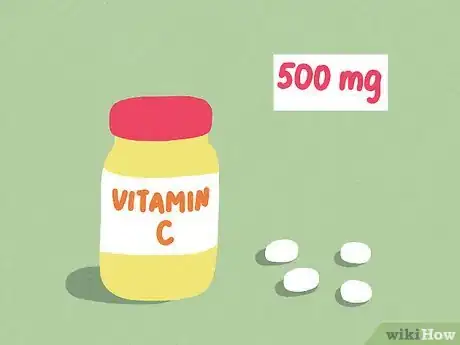




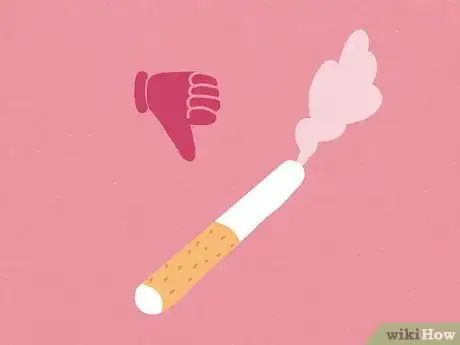
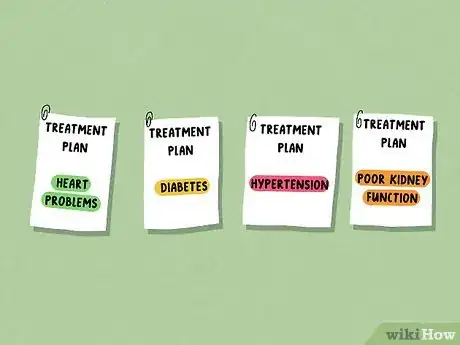







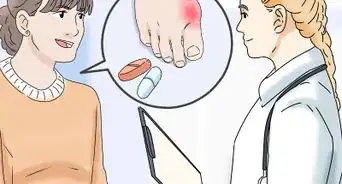

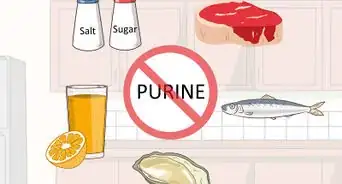





















































Medical Disclaimer
The content of this article is not intended to be a substitute for professional medical advice, examination, diagnosis, or treatment. You should always contact your doctor or other qualified healthcare professional before starting, changing, or stopping any kind of health treatment.
Read More...